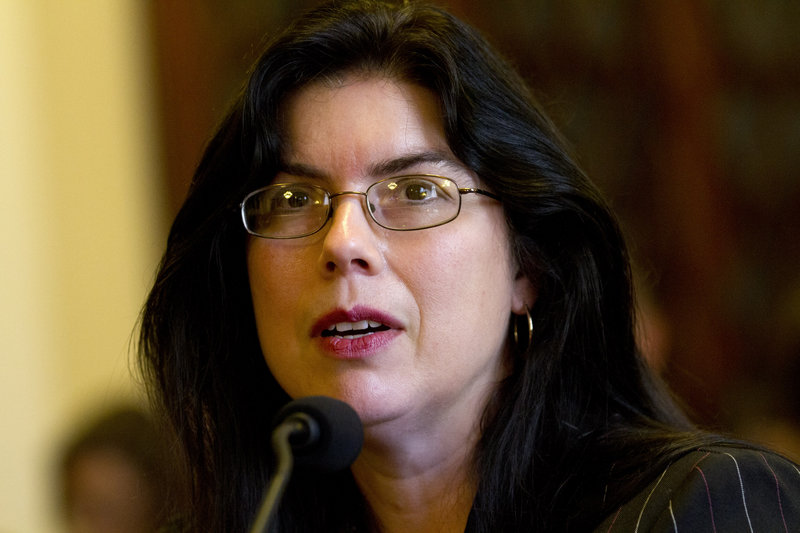WASHINGTON – After trying for decades to suppress memories that nearly destroyed her life, Ruth Moore would have been forgiven had she struggled with the words Wednesday as she recounted being raped as a young Navy enlistee and her ensuing years of trauma.
But with her husband and young daughter seated close behind her, Moore was resolute as she told members of Congress about the attack, the ensuing cover-up, her discharge from the Navy on a false medical diagnosis and her decades-long fight for veteran’s benefits.
“Ladies and gentlemen, this process took me 23 years to resolve, and I am one of the fortunate ones,” said Moore, a Maine native who now lives in Milbridge, as she read her testimony.
“It should not be this way. If I had been treated properly and received benefits in a timely manner back at the time of my discharge, my life would have been much different,” she said.
Moore, 43, shared her story during a House Veterans Affairs subcommittee hearing exploring why so many victims of “military sexual trauma” are having trouble getting disability benefits.
The Department of Defense estimates that as many as a quarter of the women in the military will be sexually abused or assaulted. Incidence rates among men are lower, but in both cases the vast majority of the incidents — as much as 87 percent — are not reported.
Speakers on Wednesday attributed the dismal 13 percent reporting rate largely to military culture. In an environment in which “unit cohesion” is paramount, sexual-assault victims fear being punished or retaliated against if they report it.
Then, years later, often still suffering from the traumatic events, they are frequently denied disability benefits for lack of physical proof.
Military sexual trauma victims are more likely to suffer from depression, disorders such as post-traumatic stress syndrome, and to become homeless.
“Simply put, MST has devastated the veterans’ community,” said Anu Bhagwati, a former Marine captain who now is executive director of the Service Women’s Action Network.
Moore offered her own dark experiences as evidence.
As an 18-year-old just out of boot camp, Moore was stationed in the Azores when she was raped twice by a petty officer, her superior.
She reported the incident to a chaplain but got little to no help, even as her life “spiraled downward.” Her assailant was never punished.
After a suicide attempt, she ended up in a military hospital psychiatric facility. She was later honorably discharged with “borderline personality disorder.” She claims she was never treated for her rape.
“In hindsight, it was easier for the military to get rid of me than admit to the rape,” she said.
The incident scarred Moore personally, leading to a failed marriage, trouble keeping jobs, panic attacks, night terrors, migraines and additional thoughts of suicide.
The Veterans Benefits Administration denied her disability benefits twice — in Maine and Florida — before she was granted partial benefits in 2009.
Moore was finally given access to a military sexual trauma coordinator, in Vermont in 2009, who helped her get additional benefits. The coordinator also realized that many of Moore’s medical records had been expunged — a practice that was common until recently but still happens today, Bhagwati and others said.
“I am asking you — no, pleading with you — to please consider favorably the legislation that would prevent this from happening to others,” Moore said.
That legislation, sponsored by U.S. Rep. Chellie Pingree, D-Maine, would lower the burden of proof for disability benefits for veterans who have post-traumatic stress disorder because of sexual trauma.
It would put more stock in veterans’ testimony, eliminating the need for physical proof — such as medical records — that is often long gone or never existed because the service member didn’t report the incident.
Essentially, the legislation would bring the standard of proof to the same level required for service members who have PTSD from combat or other causes. From fiscal years 2008 to 2010, only one-third of sexual trauma-related PTSD requests were approved, compared with 54 percent for all other claims, according to figures from the Service Women’s Action Network.
Pingree said Wednesday that there has been “a tremendous change in attitude” in the Defense Department and the Department of Veterans Affairs toward sexual trauma victims and benefits.
But she said more progress is needed and the VA must start giving victims of sexual trauma the benefit of the doubt.
Pingree is married to S. Donald Sussman, majority share owner of the Portland Press Herald/Maine Sunday Telegram.
Subcommittee members said they had heard talk of “zero-tolerance” policies in the past, yet the vast majority of assaults continue to go unreported and those who seek benefits afterward are still turned away.
After VA officials said existing policies could adequately accommodate disability requests for sexual trauma, subcommittee Chairman Jon Runyan, R-N.J., said more needs to be done.
“If the VA were a private company, you wouldn’t be in business very long because you wouldn’t have very many happy customers,” Runyan said.
After the hearing, Moore and her family lingered in the committee room as people thanked them for making the trip to Washington to testify.
While the emotions of it all were starting to peek through, Moore said she was pleased with the hearing and with her decision to go public with her story.
“The committee was very generous,” Moore said. “I think they truly heard the message. I think a lot of good is going to come of this today.”
Washington Bureau Chief Kevin Miller can be contacted at 317-6256 or at:
kmiller@mainetoday.com
On Twitter: @KevinMillerDC
Send questions/comments to the editors.





Success. Please wait for the page to reload. If the page does not reload within 5 seconds, please refresh the page.
Enter your email and password to access comments.
Hi, to comment on stories you must . This profile is in addition to your subscription and website login.
Already have a commenting profile? .
Invalid username/password.
Please check your email to confirm and complete your registration.
Only subscribers are eligible to post comments. Please subscribe or login first for digital access. Here’s why.
Use the form below to reset your password. When you've submitted your account email, we will send an email with a reset code.